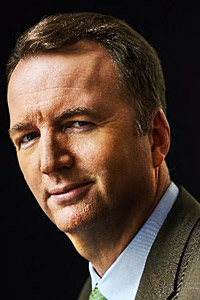
From villains to heroes. If there's one theme that has dominated markets in the opening days of the year, it's been breathless speculation about which central bank will cut interest rates first and by how much: It's no longer if but when. There's little doubt that borrowing costs will be lower in many key economies well before the end of 2024. Even the notoriously hawkish Bundesbank is on board.
That is what makes a rancorous debate within Thailand so compelling.
The issue is whether authorities should be doing more to juice growth. Not in a few months after a respectable pause in rate hikes, but now. The economy is crawling along, and inflation is non-existent; consumer prices are actually declining.
This is an argument that will resonate in emerging markets and advanced economies alike. The questions raised reverberate beyond Bangkok: Did monetary tightening go too far? Do officials stall to avoid looking like they are being pressured, or because they are still traumatised by the way inflation's spike two years ago caught them unawares?
The Federal Reserve should take note of what's unfolding in the Southeast Asian nation. The fracas has echoes of the pre-pandemic rupture between Donald Trump and Fed Chair Jerome Powell that ended almost three decades of détente between the White House and the central bank. Mr Powell survived the former and, possibly future, US president. How would the Fed fare in a Trump redo? Mr Powell's second term expires in May 2026; those who plan to stick around can't be relishing the prospect of frequent trolling.
As worthy of defence as the principle of central bank autonomy is, the Fed was vulnerable to Trump barbs about rates being too high. The pace of price increases was consistently below the target of 2%. Mr Powell inherited a Federal Open Market Committee that was in the process of unwinding the big stimulus unleashed during the Global Financial Crisis. Mr Powell was starting to have doubts, but policymakers were loath to be seen to give Mr Trump a win. Nonetheless, from early 2019, hikes were paused, and then several reductions followed.
It's a dilemma that the Bank of Thailand and its chief antagonist, Prime Minister Srettha Thavisin, must recognise. Mr Srettha, a former property developer, has a point. Like its counterparts, Thailand lifted rates aggressively. The tightening may have worked too well: Consumer prices fell 0.8% in December from a year earlier, continuing a string of declines. Soon after he took office in September, Mr Srettha began agitating for the bank to be more mindful of growth in setting policy.
Tensions have flared again. The prime minister wants outright reductions from the bank, which paused increases in November. The leader and Bank of Thailand (BoT) Governor, Sethaput Suthiwartnarueput, recently sat down for a chat. Just offering advice, Mr Srettha said, no harm in that. As a real estate guy and the person charged with overseeing the economy, there's undoubtedly a preference for lower rates. Sound familiar?
The scene recalls a dinner that Mr Powell, then-vice chair Richard Clarida and Steven Mnuchin, Mr Trump's secretary of the Treasury, had with the former president at the White House in February 2019. The vibe that emerged was of a constructive and cordial chat. Once Mr Powell and Mr Clarida were out the door, the Fed released a statement stressing that Mr Powell simply reiterated the message from his last press conference and didn't discuss his projections for policy. Mr Trump soon resumed blasting the Fed. Mr Mnuchin often explained the broadsides away as merely the personal preferences of Mr Trump. The idea was to defuse the immediate brouhaha but keep up the longer-term pressure.
Ironically, Mr Trump was close to getting at least part of what he wanted. Not because he decreed it -- he didn't have the authority. The Fed's abrupt pause and subsequent cuts through 2019 reflected worries about a slowing domestic and world economy, in part a response to Mr Trump's trade war and the failure of inflation to spike despite a long expansion and low jobless rate.
The Fed stressed the easing wasn't a response to bombast from 1600 Pennsylvania Ave, but the timing was very awkward. "These course corrections were even more humbling than normal because they corresponded with what Trump had been loudly demanding," Nick Timiraos wrote in his book Trillion Dollar Triage, which tracked the Fed during the pandemic and Trump presidency.
Economics may be on the Thai leader's side, too. Should the BoT pivot to cuts in the coming months, it would be entirely in the global monetary policy mainstream. Mr Srettha is probably also coming after the bank no matter what Mr Sethaput does. The BoT has to grin and bear it. But technocrats at the monetary authority haven't necessarily ceded the war. The institution will surely outlast the current government.
Given the predilection of the army to oust civilian governments every few years -- and then dutifully take the advice of bureaucrats -- I wouldn't bet on Mr Srettha's longevity. Nor, apparently, will the bank. The current benchmark rate is fine for now, an assistant governor told reporters on Monday. Easing can be a risky business.
Look at the case for an early easing on the merits. Try to tune out the politics, however hard that is. It's correct policy that people will remember. Let that fortify the Fed and the BoT in whatever dark days await. ©2024 Bloomberg
Daniel Moss is a Bloomberg Opinion columnist covering Asian economies.
